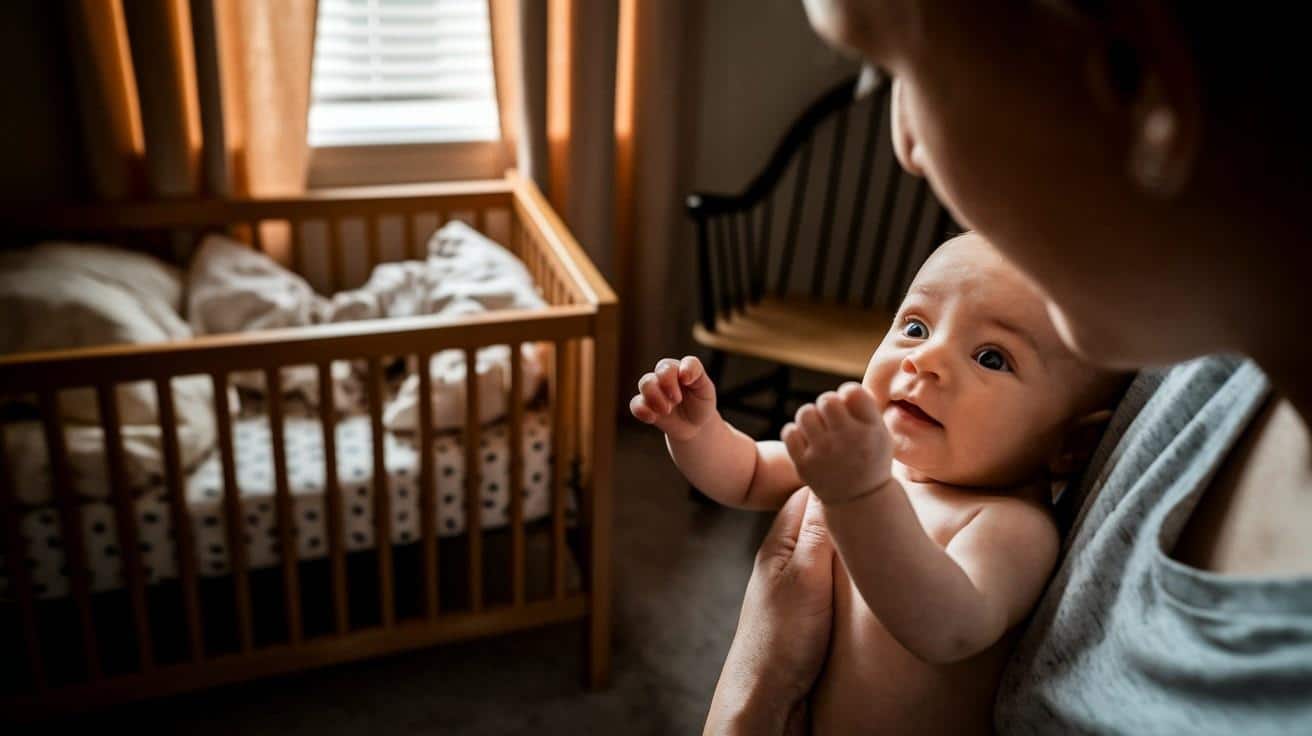
Every time you finally close your eyes, your 3-month-old wakes up crying. Sound familiar? You’re not alone in the bleary-eyed world of infant sleep.
While your baby needs 14-17 hours of sleep daily, their developing brain is constantly rewiring, causing unpredictable sleep patterns that can leave parents exhausted and confused.
Did you know that what seems like sleep regression at this age is actually your baby’s brain maturing to more adult-like sleep patterns?
This developmental leap explains those frustrating 30-minute naps and midnight wake-ups.
Suppose you’re struggling with short naps, night feedings, or swaddle transitions. Understanding what’s happening in your baby’s rapidly developing brain can help you guide this challenging but temporary phase with confidence and patience.
How Much Should a 3-Month-Old Sleep?
Your 3-month-old needs about 14-17 hours of sleep in 24 hours. But here’s the thing: All babies are different! Some thrive on 14 hours, while others need the full 17.
Most 3-month-olds sleep around 10-11 hours at night (with wakings) and 3-5 hours during the day spread across 3-5 naps. If your baby seems happy and energetic when awake, they’re probably getting enough sleep, even if their total differs from these averages.
Pro Tip: Instead of watching the clock obsessively, watch your baby. A well-rested baby is alert, engaged, and can stay awake without getting cranky during appropriate wake windows.
Sample Sleep Schedule for a 3-Month-Old
| TIME | ACTIVITY |
|---|---|
| 7:00 AM | Wake up & feeding |
| 8:30–9:30 AM | Nap 1 |
| 11:00–12:00 PM | Nap 2 |
| 1:30–2:30 PM | Nap 3 |
| 4:00–4:45 PM | Nap 4 |
| 6:00–6:30 PM | Optional catnap |
| 7:30 PM | Bedtime routine |
| 8:00 PM | Bedtime |
You’ve probably heard about “wake windows” – these are the periods your baby can comfortably stay awake between sleeps. At 3 months, most babies have wake windows of 1-2 hours. Watching for sleepy cues (yawning, eye rubbing, fussiness) helps you catch the perfect moment for naps.
Remember, this is just a framework. Your baby might take shorter naps more frequently or longer naps less often. The key is finding what works for your little one.
Why Does My 3-Month-Old Keep Waking Up at Night?

You put your baby down, tiptoe away, and just as you’re about to enjoy that coveted me-time… they’re awake again! Why?
At 3 months, your baby’s internal clock (circadian rhythm) is still developing. Their body is learning to distinguish between day and night. This biological change affects how they cycle through light and deep sleep.
Common reasons for night-waking include:
- Hunger: Most 3-month-olds still need 1-3 night feedings.
- Comfort seeking: Babies often want reassurance during the night.
- Sleep cycle transitions: Babies wake briefly between sleep cycles (every 45 minutes or so).
- Developmental leaps: Mental and physical growth can disrupt sleep.
- Overtiredness: Ironically, not enough daytime sleep can lead to more night-wakings.
Did you know that many babies actually make noises, move around, and even open their eyes during sleep? Sometimes what appears to be waking is actually your baby transitioning between sleep cycles. If you rush in too quickly, you might accidentally wake a baby who was actually still sleeping!
Is There a Sleep Regression at 3 Months?
You might have heard whispers about the dreaded “4-month sleep regression” and wonder if it’s starting early. What parents call a “regression” is actually a progression in your baby’s brain development.
Around 3-4 months, your baby’s sleep patterns mature to become more adult-like. Instead of falling directly into deep sleep, they now enter light sleep first. This makes it harder for them to stay asleep when they’re put down drowsy or during transitions between sleep cycles.
This isn’t a step backward—it’s your baby’s brain developing exactly as it should! But yes, it can be exhausting for parents.
Managing Short Naps

“My baby only naps for 30 minutes at a time!” This is perhaps the most common complaint from parents of 3-month-olds.
Short naps (30-45 minutes) are developmentally normal at this age. This is exactly how long one sleep cycle lasts for babies. The challenge is helping them connect sleep cycles.
Pro Tip: If your baby wakes after 30 minutes, wait a few minutes before rushing in. Sometimes babies will fuss briefly and then fall back asleep for another cycle. Going in too quickly can prevent them from learning this skill.
Should I Swaddle My 3-Month-Old?
Swaddling can be a wonderful sleep tool, but safety comes first. The American Academy of Pediatrics recommends stopping swaddling as soon as your baby shows signs of rolling, which often happens around 3-4 months.
If your baby isn’t rolling yet, swaddling may still help them sleep better. When it’s time to transition, try:
- One arm out swaddle
- Sleep sacks with arms up option
- Wearable blankets
- Zipadee-Zip or similar transitional products
Many babies actually sleep better after transitioning from the swaddle because they can find their hands for self-soothing.
Can My 3-Month-Old Sleep with a Pacifier?

Yes! Pacifiers are safe for sleep at this age and are recommended by the American Academy of Pediatrics. Studies show that using a pacifier during sleep can reduce the risk of SIDS by up to 90%.
Benefits of pacifier use include:
If your baby wakes when the pacifier falls out, you might find yourself on “pacifier duty” all night. For some babies, learning to replace their pacifier becomes a valuable self-soothing skill around 5-7 months.
Sleep Training for a 3-Month-Old
Is 3 months too early for sleep training? Most pediatric sleep experts recommend waiting until 4-6 months to begin formal sleep training. However, you can start building healthy sleep habits now:
- Establish consistent bedtime routines
- Put baby down drowsy but awake when possible
- Create clear differences between day and night environments
- Gradually reduce assistance as baby shows readiness
If you’re struggling significantly, gentle methods like “The Chair Method” or “Pick-Up-Put-Down” can be adapted for younger babies. Always respond to hunger cues at this age, as most 3-month-olds still need night feedings.
The Importance of Naps for Your Baby’s Development
Though often overlooked in favor of night sleep, naps are crucial for your baby’s development. Quality daytime sleep:
- Helps brain development and memory consolidation
- Prevents overtiredness that disrupts night sleep
- Regulates mood and reduces fussiness
- Supports immune function
- Gives parents short breaks throughout the day
Interestingly, studies show that babies who nap well often sleep better at night, too. Rather than thinking, “keeping baby awake during the day will help them sleep better at night,” remember that “sleep begets sleep.”
Adjusting to Longer Naps: A Case Study
Zach’s parents were exhausted from his constant catnapping. At 12 weeks, he never slept longer than 35 minutes during the day, which led to an overtired, fussy baby by evening and frequent night-wakings.
They focused on watching his sleepy cues rather than the clock and darkened his room completely for naps. They also extended his first wake window slightly and shortened the others. Within ten days, Zach began taking at least one nap longer than an hour each day.
The result? A happier baby during the day and longer stretches at night. His parents noticed he was more engaged during playtime and his fussy evening period improved dramatically.
What Are the Developmental Milestones for a 3-Month-Old?

At 3 months, your baby is experiencing remarkable developmental changes that impact their sleep patterns. With improved head control, they’re receiving more visual stimulation, which can be distracting at bedtime.
Their heightened awareness of their surroundings may make falling asleep more challenging. As they begin to roll, you’ll need to reconsider sleep positions and swaddling approaches.
Their growing social awareness increases their interest in interactions, potentially creating a “fear of missing out” when it’s time to sleep.
Meanwhile, improved hand coordination offers new opportunities for self-soothing. While these exciting developments might temporarily disrupt sleep, they ultimately contribute to the formation of more mature sleep patterns.
Do 3-Month-Old Babies Need to Eat During the Night?
Most 3-month-olds still need 1-3 night feedings. Their small tummies can’t always hold enough calories during daytime hours alone.
Some babies might be physically ready to reduce night feedings now, while others still genuinely need them. Trust your instincts and your pediatrician’s guidance on your baby’s individual needs.
Pro Tip: Feed your baby fully during the day to maximize night sleep potential. Consider offering a “dream feed” (feeding while baby is still mostly asleep) before you go to bed to extend their longest sleep stretch.
Key Tips for Managing Short Naps
Creating the perfect sleep environment can make a big difference in nap length:
- Make the room very dark (blackout curtains can help)
- Use white noise continuously during sleep
- Keep the room comfortably cool (68-72°F)
- Dress baby appropriately for temperature (not too hot or cold)
- Follow age-appropriate wake windows
- Watch for early sleepy cues
Most importantly, be flexible. Some days will go according to plan, and others won’t. Your baby is learning a new skill, and like all skills, it takes practice.
Remember that this challenging phase is temporary. In a few months, your baby will take more predictable, longer naps, and you’ll forget these exhausting days (well, mostly!). Until then, take it one nap at a time, and celebrate the small victories along the way.
The Last Note
Your 3-month-old’s sleep travel reflects their remarkable development—from improving head control to emerging hand coordination for self-soothing. While most babies this age need 10-11 hours of nighttime sleep with 1-3 feedings and 3-5 naps totaling 3-5 hours during the day, remember that every baby is unique.
Short 30-45 minute naps are perfectly normal as babies learn to connect sleep cycles.
Rather than focusing solely on schedules, watch your baby’s cues and create an optimal sleep environment with darkness, white noise, and comfortable temperatures.
This challenging period won’t last forever—your baby is developing the foundation for mature sleep patterns.
By responding to their needs while gradually encouraging independent sleep skills, you’re helping them build healthy sleep habits that will benefit you both for years to come.
If you’re interested in more informational content on mothers and babies, feel free to click here and research other blogs that you might enjoy.
